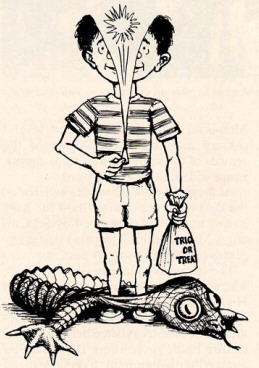Again the doorbell. I opened to find a small green monster pressing the button with his webbed finger. He was accompanied by a chubby fairy princess and an impish gremlin with braces. I'd been welcoming strange visitors all evening, so I was prepared when a webbed hand thrust forward a battered orange sack and I heard a disconcertingly familiar voice exclaim, "Trick or treat!"

Marvin! Who could be tricked? That obnoxious child who delighted in provoking the neighborhood dogs into frenzies of distressed yipping. His faded sneakers peeped from beneath his monster scales. But I could see he was taking his role seriously, glaring at me with menace from behind his plastic mask. Tonight, for a couple of hours, he was a creature from another planet.
Marvin's mother lingered casually on the sidewalk, apparently unalarmed by her son's hideous transformation. That baby she had nurtured, that toddler she had guided, that eight-year-old she endured, had accepted a frightening new role for the evening. Yet from her perspective, Marvin remained dependent on her care, and as they started on their way to the next home, I heard her warning him to be careful crossing the street.
Ironically, Marvin's role-playing does not end when he and his mother return home. Even after the costume is left in a messy green heap on the floor, Marvin still doesn't become his real self. He continues to play a role as his mother's darling, his sister's persecutor, and as the most valuable shortstop in his league. In a few years he will be wearing a different costume. He'll be a little taller, a little stronger. And he'll have new ambitions and tastes. The new Marvin will like fast cars and blondes more than earthworms and baseball, and in a few years he will give up those things for a home in the suburbs. His body will change completely. His outlook on life, his pleasures, his deepest desires will be transformed again and again with the passage of time. Yet Marvin will remain the same person, playing out a succession of roles appropriate to his psychophysical changes.
Who is Marvin really? We can't say he's a little boy, any more than we can say he's a little green monster; these are temporary identities. The real Marvin must be that constant presence that endures throughout the most drastic of physical changes, a source of energy unaffected by bodily designations. This is evident when Marvin finally dies. All of the physical components lie there, unchanged yet now immobile, except for that one missing ingredient Marvin.
Marvin is a spirit soul. In his original, pure state he is free from the inconvenience of bodily change. Indeed, he has a spiritual identity an identity that is not only real and tangible but, unlike material identities, permanent.
Identifying with the changing body is a characteristic of material contamination. We truly believe the body to be the self; thus the invariable difficulties of disease, old age, and death always plague us. It's an unnatural condition that never quite satisfies the needs of the spirit soul. Just as Marvin cannot actually live like a ferocious reptilian monster, we cannot be satisfied with a life punctuated by cancerous growths, volcanic eruptions, or financial deprivation.
To become liberated from the illusion that the body is the self and the material world is a comfortable home is a worthy goal of human life. To understand the reality of our existence, to see beyond the temporary coverings of the body, and to act in a way that transcends the influence of maya's* [*The illusory energy of God that deludes living entities into forgetting their spiritual nature.] tricks will give significance to a life that would otherwise simply be another masquerade.
As I watched Marvin and his crew dart across the street, a crowd of goblins and witches and robots headed up my walk. 'Trick or treat!" they called.
Tricked, I thought, by layer upon layer of illusory roles. How much fun it is to pretend different temporary identities. But how disastrous to have not even an inkling of your permanent identity.
